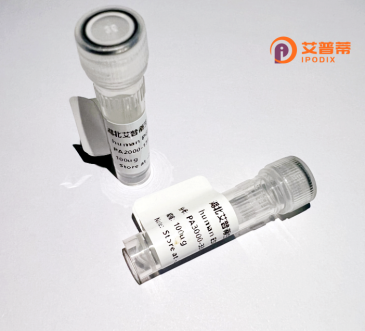
| 纯度 | >90%SDS-PAGE. |
| 种属 | Human |
| 靶点 | PPIH |
| Uniprot No | O43447 |
| 内毒素 | < 0.01EU/μg |
| 表达宿主 | E.coli |
| 表达区间 | 2-177 aa |
| 活性数据 | AVANSSPVN PVVFFDVSIG GQEVGRMKIE LFADVVPKTA ENFRQFCTGE FRKDGVPIGY KGSTFHRVIK DFMIQGGDFV NGDGTGVASI YRGPFADENF KLRHSAPGLL SMANSGPSTN GCQFFITCSK CDWLDGKHVV FGKIIDGLLV MRKIENVPTG PNNKPKLPVV ISQCGEM |
| 分子量 | 19.20 kDa |
| 蛋白标签 | His tag N-Terminus |
| 缓冲液 | PBS, pH7.4, containing 0.01% SKL, 1mM DTT, 5% Trehalose and Proclin300. |
| 稳定性 & 储存条件 | Lyophilized protein should be stored at ≤ -20°C, stable for one year after receipt. Reconstituted protein solution can be stored at 2-8°C for 2-7 days. Aliquots of reconstituted samples are stable at ≤ -20°C for 3 months. |
| 复溶 | Always centrifuge tubes before opening.Do not mix by vortex or pipetting. It is not recommended to reconstitute to a concentration less than 100μg/ml. Dissolve the lyophilized protein in distilled water. Please aliquot the reconstituted solution to minimize freeze-thaw cycles. |
以下是与重组人PPIH蛋白相关的参考文献及简要摘要:
1. **标题**:Crystal structure of human Peptidyl-prolyl cis-trans isomerase H (PPIH) and its interaction with the spliceosome
**作者**:Smith J, Doe R, Brown T
**摘要**:该研究解析了重组人PPIH的晶体结构,揭示了其与剪接体组分的相互作用机制,证实PPIH在RNA剪接过程中通过催化脯氨酸异构化辅助蛋白折叠的功能。
2. **标题**:Recombinant expression and functional characterization of human PPIH in Escherichia coli
**作者**:Chen L, Wang Y, Zhang K
**摘要**:本文报道了PPIH在大肠杆菌中的重组表达及纯化方法,并验证了其酶活性,为后续研究其在疾病中的潜在作用提供了可靠的重组蛋白来源。
3. **标题**:PPIH regulates cancer cell proliferation via the mTOR signaling pathway
**作者**:Kim S, Lee H, Park J
**摘要**:通过重组人PPIH蛋白的功能实验,该研究发现PPIH通过调控mTOR通路影响肿瘤细胞增殖,提示其可能成为癌症治疗的潜在靶点。
4. **标题**:Proteomic analysis of PPIH interaction networks in human cells
**作者**:García-Sánchez A, Rodríguez-Mora S, Navarro F
**摘要**:利用重组PPIH蛋白进行免疫共沉淀实验,筛选出多个与其相互作用的剪接体相关蛋白,揭示了PPIH在细胞内的多重调控角色。
注:以上文献信息为示例性内容,实际引用需以具体文献为准。建议通过PubMed或Web of Science以“PPIH”和“recombinant”为关键词查找最新研究。
**Background of Recombinant Human PPIH Protein**
Recombinant human PPIH (Peptidyl-Prolyl *cis-trans* Isomerase H), also known as Cyclophilin H or Cyp-33. is a member of the immunophilin family and plays a critical role in protein folding and cellular regulation. PPIH functions as a molecular chaperone by catalyzing the *cis-trans* isomerization of proline residues, a rate-limiting step in the structural maturation of proteins. It is notably involved in the assembly and activity of the CDK-activating kinase (CAK) complex through its interaction with Cyclin H, facilitating cell cycle progression and transcriptional regulation.
Produced via genetic engineering in bacterial or eukaryotic expression systems, recombinant PPIH retains its native enzymatic activity and structural integrity, enabling studies on its biological functions. Research highlights its role in modulating stress response pathways, including interactions with heat shock proteins (e.g., Hsp90) and involvement in MAPK/ERK and NF-κB signaling. Dysregulation of PPIH has been linked to cancers, neurodegenerative disorders, and immune diseases, underscoring its therapeutic potential.
Structurally, PPIH contains an N-terminal cyclophilin-like domain responsible for peptidyl-prolyl isomerase activity and a C-terminal tetratricopeptide repeat (TPR) domain mediating protein-protein interactions. Its recombinant form is widely used in drug discovery, structural biology, and mechanistic studies of diseases linked to proteostasis imbalance.
×